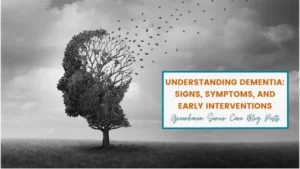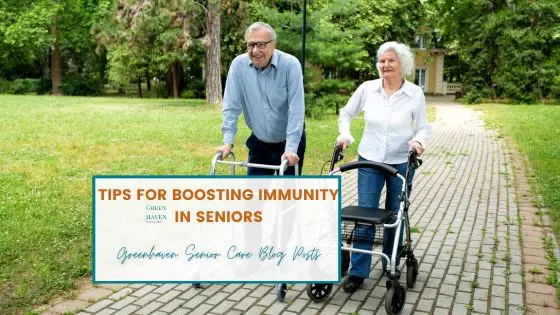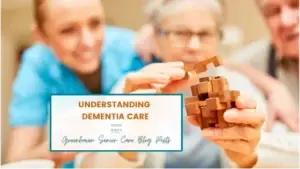
Understanding Dementia: Signs, Symptoms, and Early Interventions
Call (206) 801-7555 Or Contact Us for Room Availability, Pricing, or if you are a family member or friend of our residents. Dementia is a
Call (206) 259-5157 Or Contact Us for Room Availability, Pricing, or if you are a family member or friend of our residents.

As the golden years approach, maintaining optimal health becomes a top priority for seniors, and a key component of this is a robust immune system. The immune system’s role in protecting the body from illnesses is well-established, but understanding how it evolves with age is essential for tailoring strategies to boost immunity in seniors. In this guide, we’ll delve into the changes the aging immune system undergoes and explore practical tips and lifestyle changes that can fortify seniors’ immune defenses.
A. The immune system serves as the body’s defense against pathogens, but it undergoes changes as individuals age. The efficiency of immune responses may diminish, making seniors more susceptible to infections and illnesses.
B. Specific challenges faced by seniors include a decline in the production of immune cells, a reduction in the ability of immune cells to communicate, and changes in the body’s inflammatory response.
C. Recognizing these challenges is crucial for developing effective strategies to support the immune health of seniors.
A. Seniors benefit immensely from a balanced and nutrient-rich diet that provides essential vitamins and minerals crucial for immune function.
B. Vitamin C, D, and E play pivotal roles in supporting the immune system, and seniors should focus on incorporating foods rich in these vitamins into their diets.
C. Immune-boosting foods, such as fruits, vegetables, lean proteins, and whole grains, should be staples in seniors’ daily meals to provide a diverse range of nutrients.
A. Physical activity is a cornerstone of overall health and can significantly impact the immune system. Seniors should engage in a mix of aerobic exercises, strength training, and flexibility exercises to support their immune function.
B. Tailoring exercise routines to accommodate seniors’ needs and abilities is essential. This can involve low-impact activities, water aerobics, or even chair exercises to ensure safety and effectiveness.
A. The connection between sleep and immune health is profound, and seniors often face challenges in maintaining quality sleep.
B. Establishing a consistent bedtime routine, optimizing the sleep environment, and addressing common sleep disorders, such as insomnia or sleep apnea, can significantly improve sleep quality for seniors.
A. Chronic stress can compromise the immune system, making stress management crucial for seniors. Mind-body practices like meditation, mindfulness, yoga, and tai chi offer effective ways to alleviate stress.
B. Incorporating these practices into daily life can have a positive impact on both mental well-being and immune function.
A. Proper hydration is often overlooked but is crucial for maintaining immune health. Aging can alter seniors’ hydration needs, making it essential to pay attention to adequate fluid intake.
B. Practical tips for staying hydrated include incorporating water-rich foods, setting reminders to drink water, and adjusting fluid intake based on activity levels and climate.
A. Vaccinations are a vital component of preventive healthcare for seniors. Influenza, pneumonia, and shingles vaccines are particularly recommended to protect against common infections.
B. Regular health check-ups and screenings are essential for early detection of potential health issues, allowing for prompt intervention.
A. Social interactions and mental well-being are interconnected with immune health. Seniors benefit from engaging in social activities, whether through clubs, volunteering, or leveraging technology to stay connected with loved ones.
B. Fostering a sense of community and belonging can positively impact mental health, reducing stress and contributing to overall well-being.
Conclusion:
In embracing these holistic approaches—ranging from nutrition and exercise to sleep, stress management, hydration, preventive healthcare, and social connections—seniors can take proactive steps toward fortifying their immune systems. As we collectively work towards supporting the well-being of our aging population, these strategies play a pivotal role in ensuring seniors lead healthy, fulfilling lives.

Call (206) 801-7555 Or Contact Us for Room Availability, Pricing, or if you are a family member or friend of our residents. Dementia is a

Dementia is a challenging condition for both individuals and their families. Learn about dementia, its impact, and why Greenhaven Senior Care in Edmonds is the best choice for compassionate and personalized dementia care

Discover the best senior-friendly activities in Edmonds, WA! From scenic waterfront strolls and cultural events to top dining spots like Arnies and Epulo Bistro, explore engaging ways to stay active and social. Whether you enjoy art classes, farmers markets, or a relaxing ferry ride, Edmonds offers something for everyone. Read on for our top recommendations!

Call (206) 259-5157 Or Contact Us for Room Availability, Pricing, or if you are a family member or friend of our residents. At Greenhaven Senior Care
You have successfully joined our subscriber list.